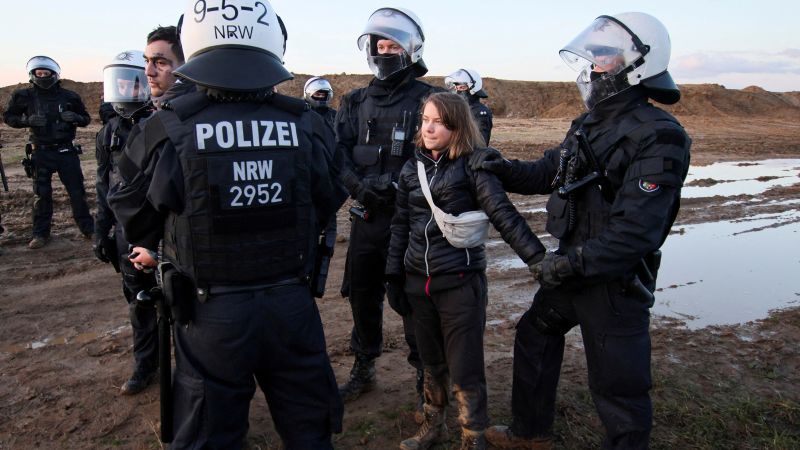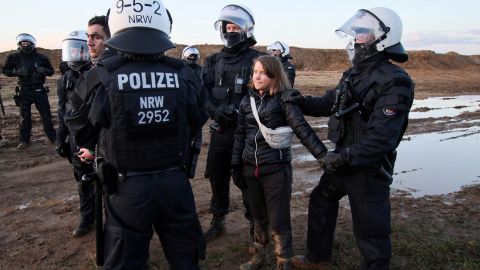
CNN
—
Swedish climate activist Greta Thunberg was released by German police on Tuesday evening after being detained earlier in the day at a protest over the expansion of a coal mine in the western village of Lützerath, police confirmed to CNN on Wednesday.
”Thunberg was only briefly detained. Once (Thunberg’s) identity was established, she was free to go,” Max Wilmes, police spokesman in the city of Aachen, told CNN.
”Due to the recognition of her name, police sped up the identification process,” Wilmes said. He said she then waited for other protesters to be released.
Thunberg swiftly resumed campaigning on Wednesday, tweeting: “Climate protection is not a crime.”
“Yesterday I was part of a group that peacefully protested the expansion of a coal mine in Germany”, the activist said, adding: ”We were kettled by police and then detained but were let go later that evening.”
Thunberg was part of a large group of protesters that broke through a police barrier and encroached on a coal pit, which authorities have not been able to secure entirely, police spokesman Christof Hüls told CNN Tuesday. This is the second time Thunberg has been detained at the site, he said.

Since last Wednesday, German police have removed hundreds of activists from Lützerath. Some have been at the site for more than two years, CNN has previously reported, occupying the homes abandoned by former residents after they were evicted, mostly by 2017, to make way for the lignite coal mine.
The German government reached a deal with energy company RWE, the owner of the mine, in 2022, allowing it to expand into Lützerath in return for ending coal use by 2030 – rather than 2038.
Once the eviction is complete, RWE plans to build a 1.5-kilometer (0.93-mile) perimeter fence around the village, sealing off its buildings, streets and sewers before they are demolished.
Thunberg tweeted on Friday that she was in Lützerath to protest the expansion. On Saturday, she joined thousands of people demonstrating against the razing of the village.
Addressing the activists at the protest, Thunberg said, “The carbon is still in the ground. And as long as the carbon is in the ground, this struggle is not over.”
Hüls said Thunberg had “surprisingly” returned to protest on Sunday, when she was detained for the first time, and then again on Tuesday.
The expansion of the coal mine is significant for climate activists. They argue that continuing to burn coal for energy will increase planet-warming emissions and violate the Paris Climate Agreement’s ambition to limit global temperature rise to 1.5 degrees Celsius above pre-industrial levels. Lignite is the most polluting type of coal, which itself is the most polluting fossil fuel.
“We need to stop the current destruction of our planet and sacrificing people to benefit the short-term economic growth and corporate greed,” Thunberg said.
Clashes between activists and police have been ongoing this month, and photos from the protests have shown police wearing riot gear to remove the demonstrators.
More than 1,000 police officers have been involved in the eviction operation. Most of the village’s buildings have now been cleared and replaced with excavating machines.
RWE and Germany’s Green party – a member of the country’s governing coalition – both reject the claim the mine expansion will increase overall emissions, saying European caps mean extra carbon emissions can be offset. But several climate reports have made clear the need to accelerate clean energy and transition away from fossil fuels. Recent studies also suggest that Germany may not even need the extra coal. An August report by international research platform Coal Transitions found that even if coal plants operate at very high capacity until the end of this decade, they already have more coal available than needed from existing supplies.
